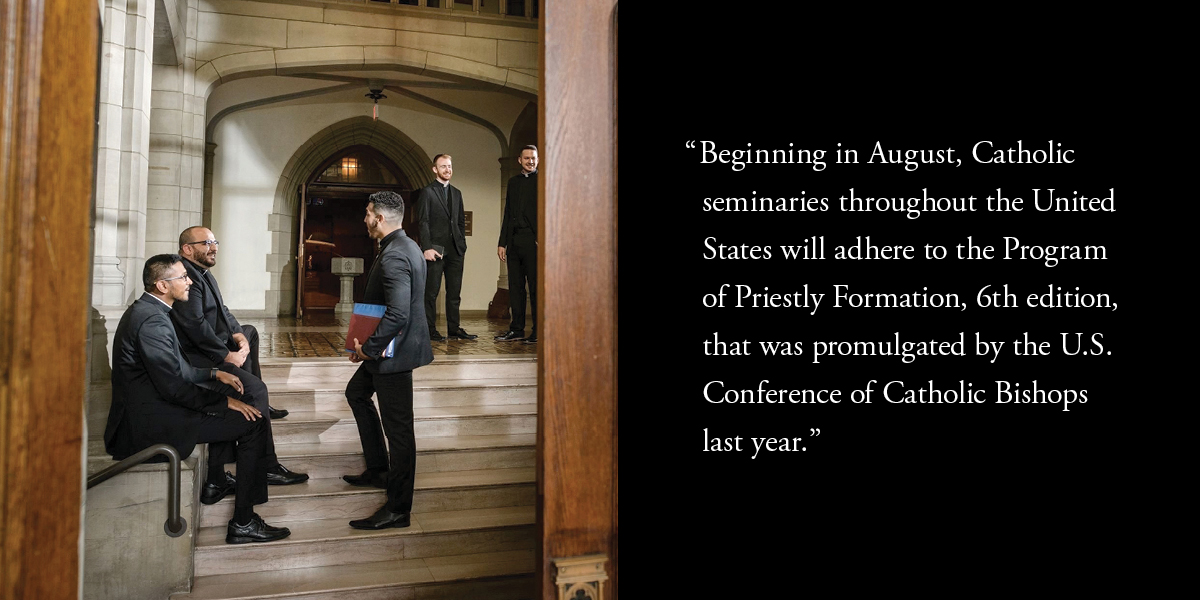
The seminary process at a glance
Beginning in August, Catholic seminaries throughout the United States will adhere to the Program of Priestly Formation, 6th edition, that was promulgated by the U.S. Conference of Catholic Bishops last year. This new set of guidelines delineates the formation process into four stages: the Propaedeutic stage, the Discipleship stage, the Configuration stage, and the Vocational Synthesis stage. Each stage has goals specific to the four dimensions of formation: human, spiritual, intellectual, and pastoral.
This fall, the Diocese of Burlington will have eight seminarians in various stages of the seminary process, as shown on the timeline on the following page.
The newly added Propaedeutic stage is the first stage of the seminary process and “seeks to provide seminarians with the basic groundwork they need to engage in priestly formation,” notes the Program of Priestly Formation. Seminarians in this stage spend one year living in a house of formation with a focus on prayer, fraternity, and study. The Diocese will be welcoming two new seminarians in August; they will be among the first men to begin their seminary formation in this new Propaedeutic stage.
Upon successful completion of the Propaedeutic stage and with the recommendation to continue their formation, seminarians will enter the Discipleship stage, which is comprised of two years of more rigorous academic study, intense prayer, and pastoral practice. During this stage, the seminarian further discerns his vocation to the priesthood with the assistance of a priest spiritual director and formation advisor. The primary area of academic study during this stage is philosophy, which lays the groundwork for the seminarian’s familiarity with and study of theology during the next stage of formation.
Again, upon successful academic completion and with the recommendation to continue to the next phase, the seminarian enters the Configuration stage which is comprised of four years of theological studies. The ministries of lector and acolyte are typically conferred during this stage, as well as the Rite of Candidacy, which is an eligibility for the man to be considered for ordination. Upon successful completion of this stage, the seminarian petitions the bishop to be ordained a transitional deacon, and with the bishop’s acceptance of his petition he calls the seminarian to ordination.
All of the stages of formation follow the standard academic calendar of a fall and spring semester, with various short breaks and a long summer break. During the summer break, seminarians receive a pastoral assignment within the Diocese. When they are in early stages of formation they often serve as Totus Tuus (a summer program for children and teens) missionaries, whereas seminarians who are three or more years into the formational process are assigned to a parish where they serve at Mass and assist the pastor with his pastoral ministries such as making communion calls and home visits and catechetical instruction.
This is also a time when the seminarian will learn first-hand about the responsibilities, expectations, and demands of parish life.
This summer, the diocesan seminarians have received the following assignments.
Mr. Luan Tran: St. John Vianney Parish in South Burlington under the pastoral supervision of Father Timothy Naples
Mr. Giang Vu: Assumption of the Blessed Virgin Mary Parish in Middlebury under the pastoral supervision of Father Luke Austin
Mr. Cale Bombardier: Corpus Christi Parish based in St. Johnsbury under the pastoral supervision of Father Lance Harlow
Mr. Anthony Maurice: Totus Tuus missionary
Mr. An Dinh: In residence at St. Michael Parish in Brattleboro under the pastoral supervision of Father Henry Furman
Mr. Loc Vo: In residence at the Cathedral of St. Joseph in Burlington under the pastoral supervision of Msgr. Peter Routhier.
The Vocational Synthesis stage takes place upon completion of the Configuration stage and happens entirely outside of the seminary. Seminarians enter this final stage of formation as ordained transitional deacons and serve within a parish until the time of their priestly ordination, for a minimum of six months. It is meant as a time of integration and transition, “a gradual realization of the cleric’s responsibility for the care of souls while he resides full time in a pastoral setting,” states the Program of Priestly Formation.
Are you interested in the priesthood?
Contact Father James Dodson at vocations@vermontcatholic.org or 802-658-6110 ext. 1175.
— Mary-Margaret Carroll and Alayna Masker in consultation with the Office of Vocations
—Originally published in the Summer 2023 issue of Vermont Catholic magazine.

